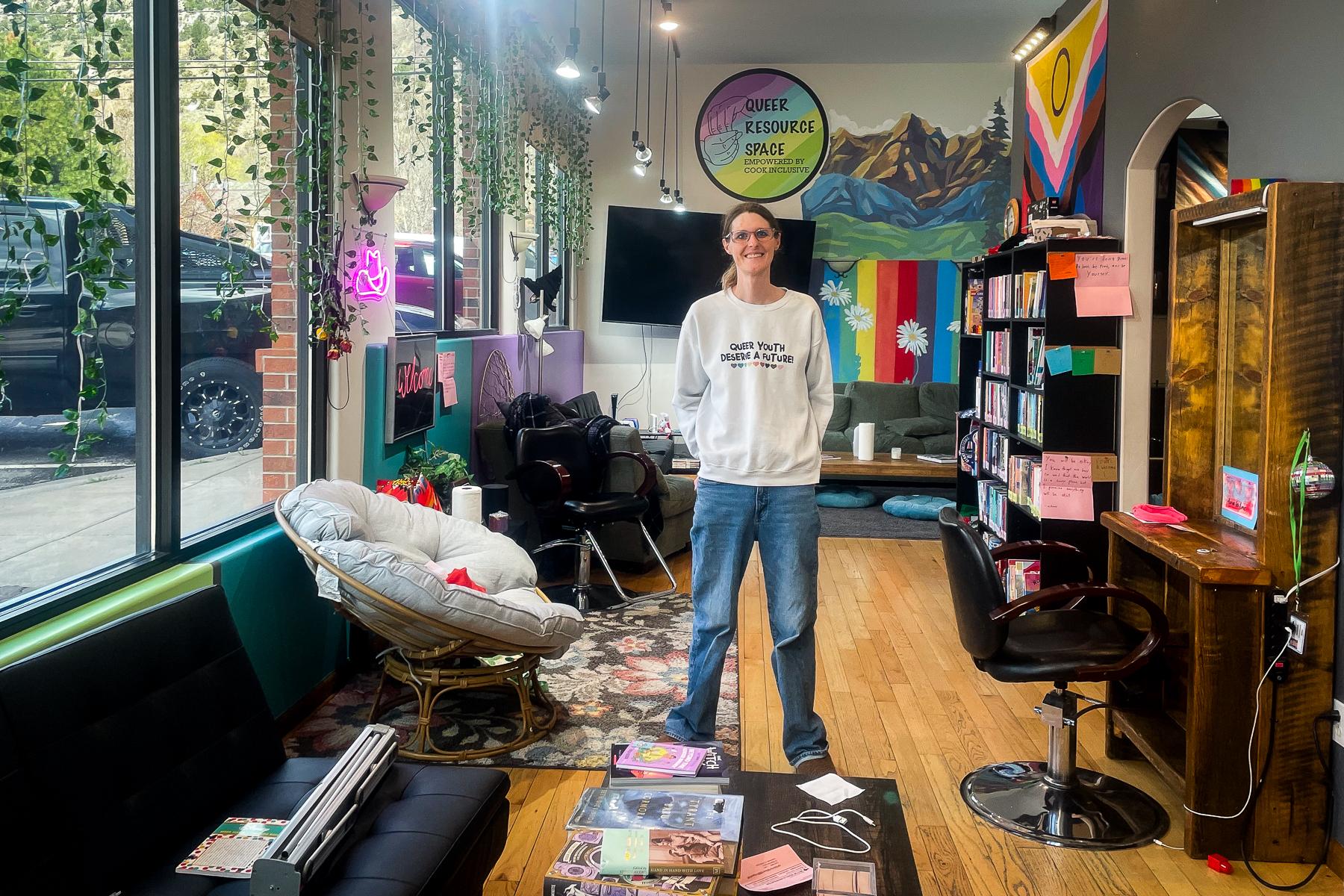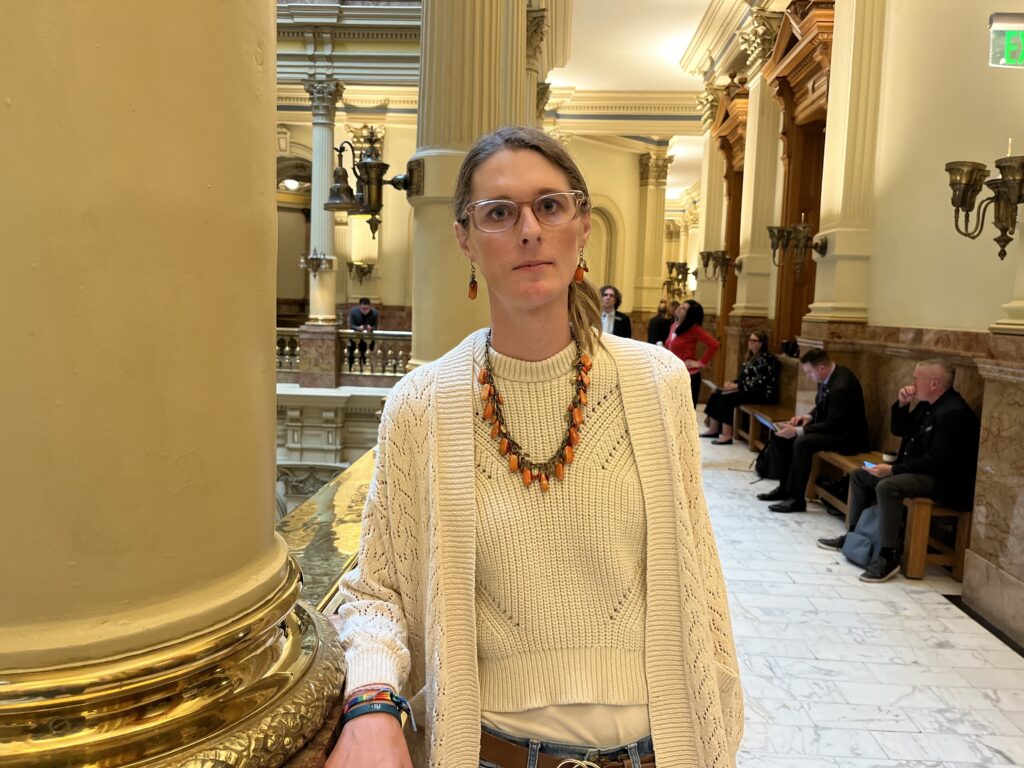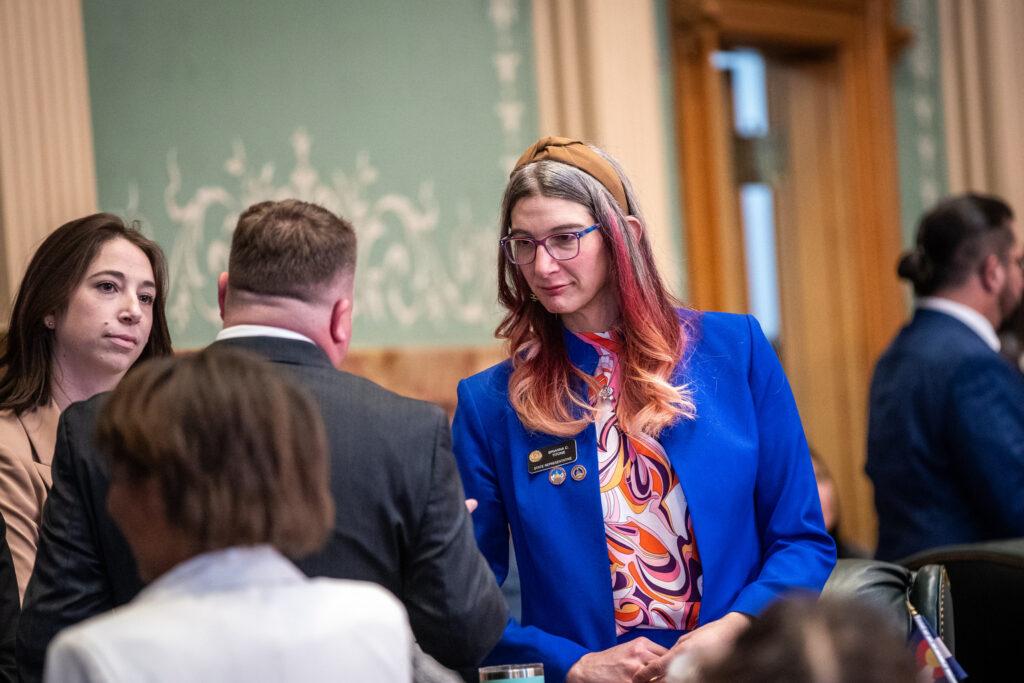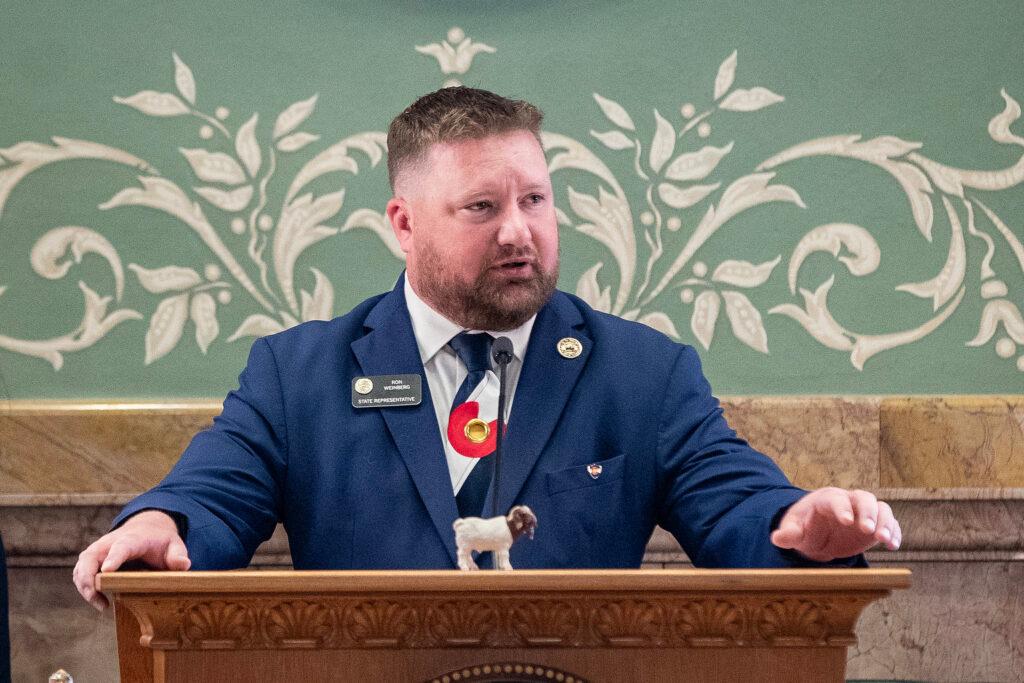
Walking down Main Street in the small Western Slope town of New Castle, there’s no missing the pastel rainbow sign for the Queer Resource Space that juts out above a brick building right next to the library.
“It is a very visible location and that's not an accident,” Ashley Stahl, who runs this space, explained. “We want to make sure that we're a part of the community, that everyone knows we're here. Our goal is to be visible.”
The space, which opened at this location in March, is light and bright, with plush couches and a big-screend TV for video games and movie nights. It has a rec-room sort of vibe; the kind of place “where everyone can just relax and feel comfortable.” A small room nearby will soon be a place for queer youth to get free mental health counseling. There’s also a small library packed with books Stahl describes as “inclusive and affirming.” She hopes to eventually set up a clothing swap and drop-in hours for students to get homework help and socialize.
Stahl, dressed in a shirt with the slogan “Queer youth deserve a future,” is a trans woman. She transitioned in the last few years and said it can be lonely, especially in places like New Castle.
“It's hard to build community in rural areas for everyone. And when you're a minority group, it's going to be even harder to find people to connect with who have shared experiences and who have connections to all of the different things,” she said, adding that she wants to help others avoid feeling this kind of isolation.
Stahl recently traveled to the State Capitol to hear lawmakers mark Trans Day of Visibility with an official resolution. She said it was worth the three-hour trip to see policymakers stand up for her community, especially at this moment.
“Frankly, it's a very scary time to be transgender. And so the moments like that are what kind of fill your cup a little bit and give you hope,” she said. “Even something as simple as making a statement and saying that we support this community, and we celebrate you, and we're there for you makes a difference for those who are able to get that message.”

But Democrats in the legislature are going much further than just statements of support this year.
At a time when the federal government is rolling back rights and recognition for transgender Americans, Colorado is poised to expand its protections in a number of areas, introducing bills on medical care, harassment, death certificates and more. But each proposal comes with its own round of debate, as opponents argue Democrats are going too far on an issue that’s proven to divide the public.
“I think it's important, when contemplating policies around this topic, that words matter and we need to ensure that we are not creating a special class of people that have rights and privileges above and beyond others,” Republican state Sen. Lisa Frizell said.
Coverage for gender-affirming care brings the most debate
On his first day in office, President Donald Trump signed an executive order removing federal recognition for any gender besides male and female, and his administration has targeted transgender people serving in the military and playing on sports teams. He’s tried to restrict gender-affirming care for people under 19 years old; cracked down on schools that support trans and nonbinary students; and told federal agencies not to pursue civil rights cases on behalf of trans people.
In the face of those moves, Democrats at the statehouse are trying to push back and increase protections for trans people, largely with legislation that builds on other laws or policies enacted in recent years.
Colorado already includes transgender people in its major anti-discrimination laws, making it illegal to deny someone housing or employment because of their gender identity or expression. But Democratic state lawmakers still see room for more explicit protections — not just against discrimination, but also in areas like medical care.
“Ultimately, passing this bill sends a powerful message,” Democratic state Rep. Brianna Titone of Arvada told colleagues during the debate over House bill 1309, which would require all health insurance plans in Colorado to cover gender-affirming care. Right now, state policy mandates insurers to cover this kind of medical care, but Titone, the state’s only transgender lawmaker, said putting it into state law would make it harder to reverse.
“It says that we see you, that we support you and that we will do what we can to ensure you can live a full and healthy life in the face of potential federal setbacks.”

Large swaths of the medical community, in particular leading U.S. medical groups, have come out in support of this type of policy, including the American Academy of Pediatrics and the American Medical Association.
Republicans universally oppose the bill.
State Rep. Dusty Johnson of Fort Morgan argued it isn’t fair to require coverage for gender-affirming care when insurance plans leave out a lot of other procedures. Elective hysterectomies and cosmetic surgery for burn patients are also situations where surgery can make people feel more comfortable in their bodies, she argued, but insurers don't have to cover them.
“If we're going to open this up to taxpayer dollars, we need to do it equally to make sure we are affirming those who need the help most,” she said.
Republicans also tried unsuccessfully to amend the bill so it wouldn’t cover any gender-affirming medical care for those under 18, focusing on surgical treatments in particular.
“I often get told, well, we're not doing this. This isn't happening. We're not doing genital surgical procedures on children,” said state Rep. Jarvis Caldwell of El Paso County. “We're not doing breast reductions on children for gender-affirming care.”
Why then, he asked, were Democrats unwilling to amend the bill to specifically exclude minors from this coverage?
“If it’s not happening, why is it in the bill?”
According to data from the National Institutes of Health the number of minors getting gender affirming surgeries is very small, but it does occur.
Bills also take on how trans people are treated in courts and schools
Democrats are also moving ahead with House Bill 1312 which includes protections for trans parents and children in family court. It would bar judges from basing custody decisions on the fact that one parent is trans, or whether a parent supports allowing their child to transition.
“We've seen instances where one partner goes after another parent and says that they're abusing their child because they're supporting them in dressing according to their gender identity or because they support them in accessing hormones,” said Democratic state Rep. Lorena Garcia, one of the sponsors. “So we are just affirmatively saying that cannot be used in custody cases.”
Another provision, this one relating to schools, requires dress code to be gender-neutral and states that any policies related to how staff use a student’s chosen, non-legal name, or whether they inform parents about it, can not be based on the student's gender identity.
Other policies in the bill would make intentionally misgendering or “deadnaming” — when a transgender person is called by the name they used prior to transitioning — a specific form of discrimination and harassment. Backers have named the bill "the Kelly Loving Act," after one of the victims of the Club Q shooting.
Democrats are also trying to ensure that death certificates accurately reflect someone’s gender or gender identity. And they’re trying to strengthen protections for parents or others who help trans youth get medical care in Colorado, if they live in states that don’t allow it.
A challenge to Capitol decorum
In recent years there have been few issues at the statehouse as divisive as trans rights legislation, because the two sides are just so far apart in how they view — and talk about — trans people. When bills have come up in committee or on the floor, the topic has often tested the legislature’s rules on decorum and civility.
State Rep. Titone’s presence at the capitol has changed how debates unfold; for the first time, there is a trans person on the floor when lawmakers argue over these issues. Due to term limits, she’s now in her final term in the House and is running for state Treasurer.
“We're a small minority and we are intentionally misunderstood. We must not allow the hatemongers to win,” she said.
Some Republican lawmakers do talk about trans people as being mentally ill and describe the gay community as a cult. But the vast majority of Republicans at the statehouse don’t use personal or pejorative language and focus their opposition on the policy, or don’t talk about the issue at all.
“I'm one of the Republicans who has run a lot of bills with Representative Titone, our trans member here, and I see her as a person. I don't judge her by her life choices,” said Republican state Rep. Matt Soper of Delta.
Republican state Rep. Ron Weinberg of Loveland has also worked closely with Titone on legislation. But during the bill to require insurance to cover gender-affirming care, he became upset when Titone compared some opposition to trans rights legislation to Nazi ideology. Weinberg is the only Jewish Republican serving in the legislature.
“I had absolutely no intention to speak on this today,” said Weinberg from the House floor. “I understand what you're trying to do, but to be told that (we’re) either white nationalists or impugn Republicans (with) talk about Nazi Germany, which is literally what my whole family went through during World War II, what are we doing?”

Many Republicans criticize Democrats for the amount of time they’ve spent on this issue, arguing they’re out of step with the general public. They point to data from places like the Pew Research Center that show the majority of Americans oppose requiring insurance companies to cover gender transition, and more than half believe minors should not receive gender-affirming care at all.
But backers of these policies, including members of the LGBTQ-plus community, believe these protections can be life-saving. Just last fall, the CDC found that more than half of transgender high school students had considered suicide in the past year.
“I's absolutely terrifying to be a transgender person,” said Stahl from New Castle. “We see attacks from the highest levels every single day. There hasn't been a day where we haven't had that.”
CPR’s Stephanie Wolf contributed to this story.
This story was produced by the Capitol News Alliance, a collaboration between KUNC News, Colorado Public Radio, Rocky Mountain PBS, and The Colorado Sun, and shared with Rocky Mountain Community Radio and other news organizations across the state. Funding for the Alliance is provided in part by the Corporation for Public Broadcasting.









